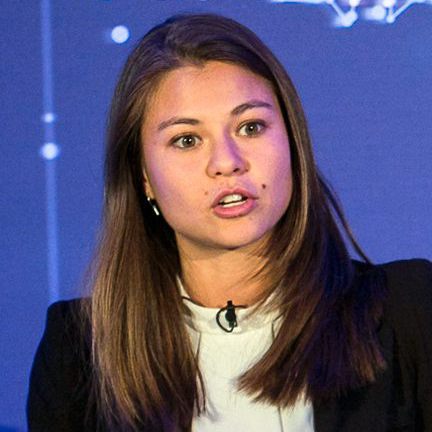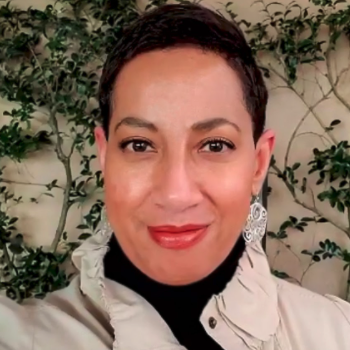< Back to all episodes
Grace Moss, Sophia Zeinu and Yvette Urbina
Advancing DEI Day to Day: From Why to How with WarnerMedia
In this episode of Impact Audio, Grace Moss, Sophia Zeinu, and Yvette Urbina share insights gleaned from their experiences leading DEI programs at WarnerMedia.

Advancing DEI Day to Day: From Why to How with WarnerMedia
Join Submittable with special guests Grace Moss, Sophia Zeinu, and Yvette Urbina of WarnerMedia for a discussion on operationalizing DEI.
Description:
Advancing diversity, equity and inclusion is not a one-and-done solution. It’s a daily practice. For entertainment leaders at WarnerMedia, prioritizing DEI is about supporting emerging talent across the company, both on-screen and off—from the writer’s room to the tech team. In this episode you’ll hear from three executives making this work happen: Grace Moss, VP of Equity and Inclusion; Sophia Zeinu, VP of Equity and Inclusion Strategies; and Yvette Urbina, VP of Equity and Inclusion—Programs and Content.
Listen in to learn about:
Top strategies for effective DEI leadership
The challenges of DEI work, pandemic aside
Why DEI is about freeing ALL of us
The tension between reducing harm now and longer-term work
When your personal “why” matters just as much your “how”
Drawn from a longer conversation on putting DEI values into action, this episode will reframe how you think about DEI work. You’ll also walk away with action items to help you support equity and drive social change.
Guests:

Grace Moss
Grace Moss is the Vice President of Equity and Inclusion for WarnerMedia. In this role, she helps oversee the enterprise’s efforts to expand the talent pool of underrepresented writers and directors and build additional pathways for diverse talent. Prior to WarnerMedia, Grace served as the Head of Talent Development & Inclusion for NBC Entertainment, where she spearheaded multiple programs that focused on discovering, cultivating, and showcasing talented writers and directors of diverse backgrounds.

Sophia Zeinu
Sophia Zeinu is the Vice President of Equity and Inclusion Strategies for WarnerMedia where she uses a data-driven, systems-based approach to develop and activate transformative equity and inclusion strategies. Prior to WarnerMedia, Sophia worked in Deloitte Consulting’s Human Capital and Diversity, Equity, and Inclusion (DEI) practices, specializing in DEI and talent current state assessments, strategy development and execution, as well as custom DEI experiential learning design and facilitation.

Yvette Urbina
Meet Yvette Urbina, Vice President, Equity & Inclusion—Pipeline and Content at WarnerMedia. In her current role, she acts as the bridge between the programs and content at the core of the company’s mission to build a more inclusive and innovative industry. Her focus is identifying talent opportunities across the enterprise through cross-divisional relationships and collaboration that result in greater equity and inclusion for all content. Yvette was most recently Vice President of Live Action Current Series at Nickelodeon, overseeing the Emmy winning Nicky, Ricky, Dicky & Dawn. She also presided over Nick at Nite’s first forays into original scripted programming, with hit series Instant Mom, starring Tia Mowry. She is a proven programming leader with a producer background—bringing the right mix of creativity and business, and was a driving force behind iconic series like The O.C., That ‘70s Show and King of the Hill in her early career.
Transcript:
Episode Notes
Learn more:
Access the full webinar featuring Grace, Sophia, and Yvette
Here are resources our guests refer to, in the order they’re mentioned:
Black representation in film and TV (McKinsey)
Christy Haubegger, Executive Vice President, Communications, and Chief Inclusion Officer
Frances X. Frei’s Trust Triangle
Interested in more quality content focused on DEI and CSR? Here are a few Submittable resources:
Measuring Social Impact: A Guide for Grantmakers and CSR Professionals (Guide)
5 Key Takeaways for CSR Professionals from the 2021 Giving in Numbers Report (Blog)
Improve Equity with #FixTheForm (Webinar)
25 Social Impact Examples from Brands Committed to Change (Blog)
The Review (Bi-monthly newsletter by Sam Caplan)
Transcript:
GRACE MOSS: We want your show to kick ass. And how can we help you? How can we introduce you to some folks that you may not know that we think we'll be great assets to you or to your room? So that's one challenge I think that we have.
Hello and welcome to Submittable’s Impact Audio. I’m Rachel Mindell. Impact Audio features short conversations (and a few longer ones) with social impact experts and practitioners. We are the podcast asking how we can do more good and do it better.
This episode is drawn from a webinar Submittable hosted on operationalizing DEI in January 2022. Today you’ll hear from three leaders at WarnerMedia: Grace Moss, VP of Equity and Inclusion; Sophia Zeinu, VP of Equity and Inclusion Strategies; and Yvette Urbina, VP of Equity and Inclusion—Programs and Content.
Each speaker has a tremendous background, bringing a wealth of expertise in entertainment and DEI to this conversation. To leave more time for their insights, I’ll let you peruse their full bios on the web page for this episode. These are exciting leaders in the field of social impact.
Laura Steele from Submittable talked with Grace, Sophia, and Yvette about their roles at WarnerMedia, the challenges DEI work presents, and their advice for putting values into action. Here’s Grace talking about her position.
***
GRACE: At WarnerMedia, we have a larger equity and inclusion group, and within that there are various pillars that each of us are a part of. And being part of the Pipeline pillar, my main goal, our team's goal is to expand the pool of talent that is in contention for opportunities within WarnerMedia.
And really create tangible and efficient pathways for underserved, underrepresented talent to get their foot in the door. And I think as far as our specific efforts, we really aim to identify exceptional talent through these programs. Whether it's a writers program, or whether it's scouting talent at a film festival, we go to where the talent is to find the best fit for us, and who we really see potential in as far as emerging voices and content creators.
We want to really be able to service the whole company in that way and be able to present wonderful talent that they may not have on their radar.
And I think as far as the larger business outcomes, all of this is in service with the ultimate goal of creating compelling content for WarnerMedia, regardless of that network or studio. And it's also in support of really establishing a culture of inclusivity, and not just welcoming that but celebrating that.
Next you’ll hear from Sophia, followed by Yvette, discussing their work.
SOPHIA ZEINU: I think that's a great point. There was a report that McKinsey put out that talks about the $10 billion opportunity with specifically even just addressing anti-black bias, right? That the industry has such an opportunity from a business perspective because people want to hear stories that authentically represent them, right?
Not just kind of having a person of color or a Black person on the screen, but really capturing the nuance of their story, and their history.
And so when you think about a lot of the work that we do on the equity and inclusion side, a lot of that is one, going back to how do we create—we know that there's so many inequities that exist within our industry, even in our organization, how do we be intentional about understanding those and addressing those in a truly systemic way.
Going beyond just trying to teach or educate an individual, but really focus on shifting the system so that it's really in support of this environment, and that creative content, and that inclusive content that really allows us to authentically tell stories, and people to engage.
On the corporate side you have a lot of the folks who are greenlighting these projects, who are key decision makers in deciding what moves forward and what doesn't. And so as we think about the partnership between all of our teams, it's really making sure that we're addressing it from both sides.
YVETTE URBINA: And I would say 100% because it starts for us, like from a creative standpoint—the first thing we're doing, if we're giving them a workshop right from the beginning—let's just say writers. They're getting a storytelling workshop right at the beginning. Teaching them about equity and inclusion, and having an inclusive environment right from the get go.
And if that writer is new—let's just say a staff writer or—really, right from the beginning, then they understand how to set the tone for a writers room. And I think that really continues on over the course of someone's career.
They're going to always think about that in the next hiring that they do. The next script that they sell.
Here, Sophia follows up by discussing strategy and focus.
SOPHIA: One of the things our leader Christy Haubegger says is, “We can do anything but we can't do everything,” right? And I think that's ultimately one of the inherent challenges in this work is there's so many different challenges that we can and should be trying to think about and wanting to solve, but ultimately we have to figure out where to focus.
And so as we think about our role as a media entertainment company that's really focused on storytelling that's really trying to shift the world through story, that's really trying to take seriously the role that story plays in creating a more just and equitable society, that's ultimately what we anchor on.
Laura asked the panel to discuss the challenges of DEI work. You’ll hear Grace followed by Yvette and then Sophia.
GRACE: I think in this work that we're doing within the DE&I space, I think some inherent challenges are, number one, just how we're perceived as far as the group and what we're trying to do. Creatively I think sometimes we can be seen as the content police, and we're just making things harder. And we want to censor, and really try to control various stories, or narratives.
And so I think just the perception of us sometimes trying to bog them down, and make their lives just harder with various asks, and new initiatives I think can sometimes be a challenge. I think it's really trying to work with them to let them know, hey, we're on the same team. We want your show to kick ass.
And how can we help you? How can we introduce you to some folks that you may not know that we think we'll be great assets to you or to your room? So that's one challenge I think that we have.
YVETTE: I mean, look, I think that we cannot ignore the elephant in the room. I started in this job during COVID. So when you add a pandemic onto working in DE&I space, people have a lot of reasons, or excuses to say no to doing things because it feels overwhelming.
I think that can just feel like a lot when you put those asks on top of everything else everybody is dealing with. And so oftentimes I think people feel like, oh, again? What else can I not say? What can I not do? And it's not about can't. It's about how this is going to make your content great. How this is going to make things better—but the challenges are real.
SOPHIA: I feel like people will often think about this work, particularly if you kind of identify with maybe like a dominant culture, or dominant identity, as specifically just about helping others without understanding that this work is about freeing yourself, right?
There's so much freedom in this work for individuals that I think sometimes people miss because they just think about it like, oh, you're just asking me to help someone else. But we're really here to help yourself. We're here to support you in doing this work, and freeing yourself in this work. And I think shifting that in the orientation is so important.
There's this natural tension to want to see change so quickly. And want to—because so many people are hurting, there's real pain and impact in the day-to-day. And knowing that in order to create systemic change some of that takes time.
So how are you balancing the need for immediate impact, immediate demonstration of, hey, I did something, with it not leaning towards performative. Really getting to the root of the issue. And so that's just like a natural tension that we're always really trying to balance.
Laura asked about strategies for building consensus around DEI goals and initiatives. Sophia responds, then Grace.
SOPHIA: I think for me, it is really helping people understand-- or for me, understanding and helping them understand their personal “why” for this work. Because I think what I've learned in doing this work over a number of years is different people have different things that motivate them to initially engage, and then to stay engaged.
Because even with the business case, that may initially engage you, but I have found it difficult for that to sustain you in this work. Because as we mentioned it's definitely hard. This is hard work, it's long term work. It's not something that's solved overnight. And so it does require sustained engagement. So I think getting to that personal why.
GRACE: Something that I learned in my career, and I will credit this to Frances Frei, who I was able to do some training with. And she's out of Harvard Business School, so I'm going to paraphrase her. Probably very poorly, but she talks about this model of building trust. And I'm thinking as far as consensus, I think that's going to be something very, very important as we work with other leaders, and key stakeholders.
It's sort of this triangle where each sort of edge is as important as the other one. And then the first one is about demonstrating empathy, and showing that you understand the circumstances, and the goals of the folks that you're working with and trying to service. And then you have the side of having a rigorous plan. If we have an idea that we want to execute, we need to make sure that it is as flawless and as effective as possible. So you need to be able to have that logistical arm as well.
And then the last part of this triangle for building trust is just authenticity, and having the sincere passion. And being genuine in your beliefs and wanting to enact some of these initiatives, or try to make an impact in these specific ways. And that's something that I am definitely using as a filter for all the work that we're doing from the pipeline perspective. And just as in everything that we do day-to-day, I think that is definitely a great practice to consider as well.
Laura then asked about strategies for putting DEI values into action.
YVETTE: How we deliver our message is so important, I think, for us. And providing resources is also just a huge part of it. Getting people to engage with the work that we're doing.
And honestly, finding the easiest way. The easiest access point for people.
And I would say that providing people access, but also engagement in the easiest, most digestible form possible makes the work both exciting and it makes it really easy.
We like to deliver things in bite size chunks to people. How can we give you a quick thing for you to learn, to read, to do it in ways that we know that you will look at it.
GRACE: I think, especially in 2020 we noticed a lot of folks in this industry and other industries being very keen to hire their one DE&I executive and call it a day. Which is great to have that first step. But I think to be effective and really make an impact, you really need to consider a couple of things.
Number one, it's important to have a strong team of folks, DE&I practitioners, to really generate the best ideas and effectively facilitate the work. I was on a panel earlier, or last year, and the other panelist was like their one DE&I person. And you know that's a lot of work for one person to really make that change.
Our team is fairly robust over at WarnerMedia. And I think that's important to really make those changes that we want to see. I think also in addition to making the head count important, I think it's also equally important to make sure that they have the financial support to do the work.
Because it takes money to be able to get the stats, and find the data, and identify the gaps, and the blind spots, and figure out which initiatives to implement and make that happen.
And then lastly, actually having the influence to elicit that change. I think sometimes companies can have that DE&I team, but sometimes when it comes to making recommendations there can be a lack of influence. And I think having all those three factors is something that will really make for a productive and successful DE&I team.
SOPHIA: So much of the time that I spend and my team spends is sitting with leaders day-to-day really helping advise. You're building this new thing, right? A new process, a new system, you're making a decision, how do we embed an equity and inclusion lens to that decision?
And there's so much of this work that's truly about embedding it in the day-to-day in addition to like accelerating it with all these amazing programs and partnerships. And that takes human capital, it takes people, it takes time. To Grace's point, we have a fairly large team and honestly, it always feels like it's not big enough. We're not able to be everywhere.
And so that becomes such a barrier sometimes, and really creating the systemic change that you want. And then at the individual level from a leader perspective, part of this is—if you are a leader who's responsible for DEI, or even if you're not, because I think part of our guiding principles is that this work is leader-lead and that everyone can play and should play an active role in driving it.
I think converting the conversation to action is really about clarity in many ways around what is it that you want to do? I go back to kind of the question I asked, what's your sphere of influence? What's the unique role that you can play in driving this work? And really defining here's what I'm going to do over the next six months, two months, year, and really having a plan in place for yourself. And if you're a DEI practitioner or someone in supporting that, really creating resources that are very specific and tactical.
If you enjoyed these excerpts, I’d really recommend checking out the full webinar, linked in the episode notes. The panelists discuss everything from gaming and ageism to accessibility and AI. It’s a really fascinating and valuable conversation.
Thanks to you for joining us today. Impact Audio is edited and produced by Jordan Marvin and Laura Steele. Submittable is a cloud-based social impact platform designed to help your team make better decisions and have a bigger impact. We’d love to partner with you to maximize social good and create lasting change through smarter technology—find out more at Submittable.com. And until next time, take good care.
Additional Resources
Season 1 , Episode 2| 14 Min
Louise Bleach and Mark Horoszowski: CSR, Social Enterprise, and Doing Well by Doing Good

Louise Bleach

Mark Horoszowski
Season 1 , Episode 10| 20 Min
The State of Corporate Purpose: Insights from CECP's 2021 Giving in Numbers Report

Sam Caplan

Natalya Taylor

Laura Steele
Season 1 , Episode 1| 56 Min
Satonya Fair and Sam Caplan: Philanthropy, Impact, and the Future of Grantmaking

Sam Caplan

Satonya Fair








